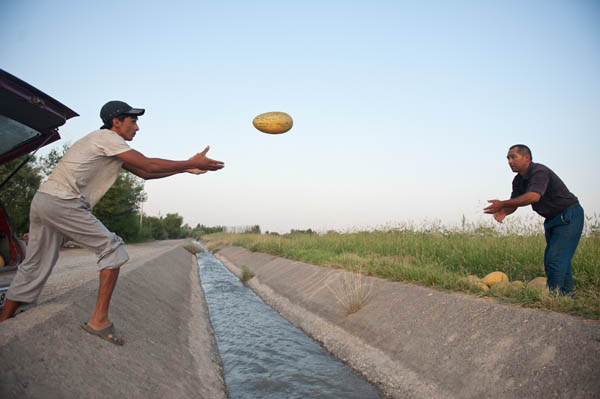Improving irrigation for water-poor farming communities in Kyrgyz Republic

The new project focuses on managing increasingly parched river basins in the Kyrgyz Republic, as well as mobilizing investment in water and sanitation infrastructure for vulnerable, water-scarce communities.
Around 110 000 people in rural and peri-urban communities will stand to directly gain from project investments.
The ‘Climate resilient water services’ project will be implemented over a seven-year period through to 2028 by the Water Resource Service, Kyrgyz Ministry of Agriculture and the Department of Drinking Water Supply and Wastewater Disposal, under the country’s State Agency for Architecture, Construction and Communal Services.
“The project is expected to enhance water service provision across multiple water-using sectors in a sustainable and inclusive way, and to promote integrated water resources management and river basin management ,” said Azad Abdulhamid, Word Bank Task Team Leader. “The project will ensure the creation of thousands of jobs and livelihood opportunities in irrigated agriculture during the implementation period and after the project completion.”
Climate and water challenges
The Kyrgyz Republic is the third most vulnerable country to climate change impacts in Eastern Europe and Central Asia, due to the sensitivity of its agricultural systems to climatic change. It is also one of the poorest countries in the region.
Depleted glaciers, decreased snowfall and increased water consumption in summer – when temperatures soar higher than they used to – are all detrimental impacts of climate change on water supply in the Kyrgyz Republic.
Droughts and floods are increasing in severity and frequency, impacting agriculture productivity, food security and the livelihoods of those who depend on farming.
According to estimates from the Global Facility for Risk Reduction and Recovery (GFDRR) – a global partnership that helps developing countries better understand and reduce their vulnerability to natural hazards and climate change – around 80 000 Kyrgyzs are affected annually by flooding, while the annual probability of droughts is projected to double by mid-century.
Promoting water security and resilience
Finance will be mobilized for civil works, equipment and services to reduce vulnerability to climate change impacts by securing access to clean drinking water and sanitation services, irrigation and drainage.
Issyk-Kul and Batken oblasts can expect to see improvements in water security and sanitation, which in turn will enhance rural and agricultural economic productivity. Three oblasts – Batken, Jalal-Abad and Osh – will also benefit from the rehabilitation and modernization of irrigation schemes and improved management of water resources.
Adaptation actions to reduce the impact of droughts include improving water conveyance efficiency – which describes the amount of water successfully used for irrigation relative to the water volume entering the system. This entails reinforcing canal networks and modernizing water delivery infrastructure. Improving bypasses and protection structures will also build resilience to floods and reduce mud-flow risks.
Strengthening water management
Small-town drinking water utilities and rural service providers will be trained to reduce their overall water consumption and improve water efficiency, and to diversify their water supply sources, decreasing their vulnerability to drought.
At the national level, project activities are expected to bolster the government’s climate-resilient water management capacity, strengthening the ability of water sector institutions at the local and national levels to prepare for disruptions and recover from climate-related water supply shocks.
This includes expanding sanitation and irrigation sector development strategies and water sector reforms, with a focus on overseeing dams as well as water and soil quality.
“Targeted investment will help reduce soil erosion, enhance soil carbon sequestration and fertility, and reduce the impact of droughts, high temperatures and extreme heat on farms in the Kyrgyz Republic,” said Anara Jumabayeva, Senior Economist, FAO Investment Centre. “Transforming equipment and services will also facilitate the uptake of innovations and best-practices for water management, based on climate resilient and low-carbon principles.”
